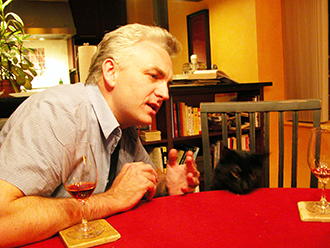As a child, I recall that many jokes were at the expense of the Polish. In particular, the jokes were geared towards the notion that Polish people were quite dumb and equipped their submarines with screen doors and always chose the wrong answer that got them shot by the crazy farmer. Ha ha.
I accepted this wholeheartedly, as we all did. It was funny to think of Polish people, or any people, being really dumb. Not to say the Poles are innocent – they tell Ukrainian jokes.
But I am here now to say that we were lied to, and that anyone capable of speaking Polish is not only smarter than we are, but much smarter, because this language could only be more complicated if they had an alphabet comprised of subtly different triangles.
Speaking Polish is akin to stuffing a box of consonants in your mouth and coughing. Vowels are rare, presumably wiped out en masse by poachers in the 1200s. The average word looks like someone tripped and fell on the keyboard. Thrice.
But the real catch is with the declinations, whereby the endings of nouns, verbs and adjectives change depending on numerous circumstances.
It’s not enough to remember what a kobieta (woman) is. Numerous factors will determine if the “a” at the end of her is actually needed, and if not, what will be replacing it.
As an example of declinations, I’ll use the English word desk and apply the various endings that it would suffer, in Polish, depending on the circumstance:
If the desk was simply sitting there, as a desk tends to do, you’re talking about a desk.
However, if that desk is no longer there, or it happens to be your brother’s, then we’re talking about a deska.
Should an angry mob attack your office and you decide to barricade yourself inside using your furniture, you’d use your deskiem to block the door.
During calmer times, when not being attacked by angry mobs, you might want to kick back, relax and put your feet on your deskie.
If a friend enquires as to where your desk is located, you’d tell him that your desku is upstairs in the spare bedroom.
And, should you be suffering from delusions and wish to yell at your furniture, you’d scream Desko!
And that’s just a damn desk.
Every noun gets the same treatment, not to mention that the adjectives and verbs suffer the same fate. On top of that, every noun is either masculine, feminine or neuter — which themselves have their own endings. And there are different endings between singular and plural. Multiply all these factors together and you’ll soon realize that even describing what you had for lunch requires levels of cerebral calculation incomprehensible to the average speaker of say, English. And most people don’t even speak English that well.
When asked why I’m studying Polish, there are two obvious answers. One, I want to be able to speak with my wife’s family on a level beyond “I like the pork cutlet. It is good.” Two, when the US implodes and I become a refugee, I want to be able to read the street signs in my new homeland. The third and less obvious answer is that the people who speak this stuff correctly must be geniuses, destined to rule the world. If I can actually manage to speak this monster of consonants and tortuous grammatical technicalities with them, I will at least be in a position to apologize to my new masters for all the jokes I made at their expense in the ’80s.
Perhaps they’ll let me off easier than someone who doesn’t know where the desku goes.


yes
Besides the fact that it’s declinations and not declensions, everything is quite right. So:
na kolana bydlaki, i uczyc sie jezykow obcych, zanim moj but nie utknie miedzy waszymi posladkami!
Agh! Declinations, my bad. Jestem dupek.
i teach first-year polish at indiana university and my students are struggling with cases. could i use this essay to explain the concept of cases? it’s written in plain language, witty, fun and easy to understand – just what my students need (quite desparately).
Well, nicely written, but I found some mistakes.
The form “desk” itself doesn’t exist, it is only the root of the word. If I want to hit someone with “deska”, I say: deską; i put my legs ‘na desce’, and that “deska jest na gorze” (the timber – it is a countable form in polish – is upstairs). Moreover “deska” is
timber, not desk. English desk = biurko in polish. Good luck in your further polish studies.
[ I am confused. At any rate, ‘deska’ was not meant to be Polish. It was English used as an example as to how the declinations work. Dzienkuje! -B. ]
We had dinner here in Florida, USA, recently with our British neighbors who visit the USA 6 months a year. I made the comment at dinner with our neighbors and their English visitors that I wish the lovely Poles that lived next door to them had come to dinner with us also. My neighbors wife said that I should not call them that name in public as it is a bad slang expression, and Polish people should not be called Poles. Am I wrong, or is she just a poor uneducated English lady?
Help me out here, please.
GG